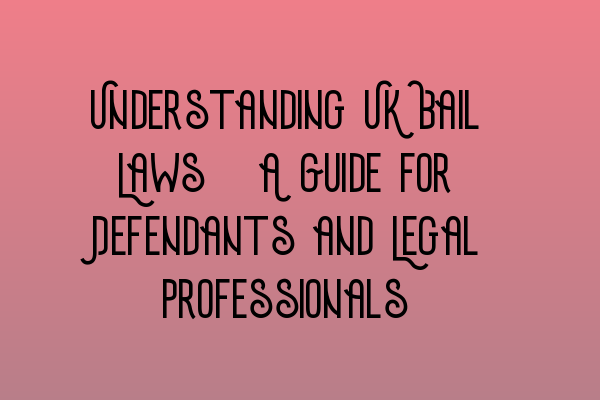Understanding UK Bail Laws: A Guide for Defendants and Legal Professionals
Being arrested and charged with a crime can be a frightening experience, and one of the key concerns that defendants and their legal representatives have is the issue of bail. Bail laws in the UK can be complex and are subject to various factors, so it’s important to have a clear understanding of how they work and what options are available.
What is Bail?
Bail is the temporary release of a defendant, with or without conditions, pending further legal proceedings. It allows individuals who are charged with a crime to be released from custody without having to remain in jail until their trial. The purpose of bail is to strike a balance between the rights of the defendant and the interests of public safety and ensuring court attendance.
How is Bail Granted?
In the UK, the decision to grant bail is made by the police at the time of arrest or by a court during a bail hearing. Several factors are considered when deciding whether to grant bail, including:
- The seriousness of the offense
- The defendant’s criminal history
- The likelihood of the defendant fleeing or failing to attend court
- The defendant’s ties to the community
- Any potential danger or threat the defendant may pose to others
It’s important to note that the court’s primary consideration is the risk of the defendant not attending court and not the defendant’s guilt or innocence regarding the charges.
Types of Bail
There are several types of bail that can be granted to a defendant:
- Conditional Bail: This type of bail requires the defendant to comply with certain conditions, such as staying away from specific individuals or places, adhering to a curfew, or surrendering their travel documents. Breaching these conditions can result in the defendant being re-arrested.
- Unconditional Bail: Also known as “own recognizance” bail, this type of bail is granted without any specific conditions. The defendant is released based on their word and promise to appear in court on the specified date.
- Surety Bail: In cases where the court considers the defendant to be a flight risk, a surety may be required. A surety is someone who agrees to take responsibility for ensuring that the defendant attends court.
- Police Bail: This type of bail is granted by the police, usually at the time of arrest, when further investigations are required. The defendant is released on the condition that they return to the police station at a specified time.
Revoking Bail
In some cases, bail may be revoked if the court determines that the defendant has breached their bail conditions or if new evidence or circumstances arise. This can result in the defendant being arrested and returned to custody until their trial.
SRA SQE Exam Dates
If you’re interested in furthering your legal career and becoming a qualified solicitor, it’s important to stay informed about the SRA SQE exam dates. These exams are a key requirement for solicitors qualifying in England and Wales, and preparing for them is crucial.
Conclusion
Understanding UK bail laws is essential for both defendants and legal professionals. It’s crucial to be aware of the types of bail available and the factors considered when granting bail. By having a clear understanding of bail laws, defendants and their legal representatives can navigate the legal process more effectively.
For more information on legal qualifications and preparing for the solicitors’ qualifying exams, take a look at our related articles:
- SQE 1 Practice Exam Questions
- SQE 1 Practice Mocks FLK1 FLK2
- SQE 2 Preparation Courses
- SQE 1 Preparation Courses
- SRA SQE Exam Dates
